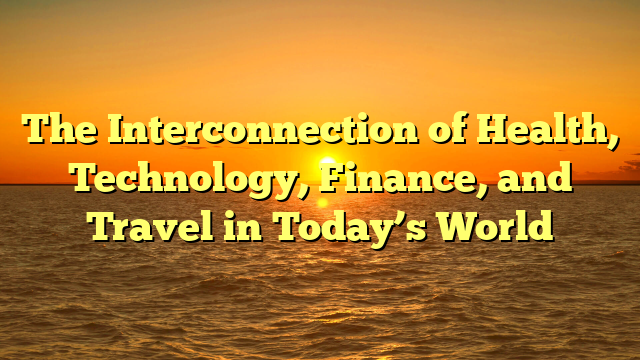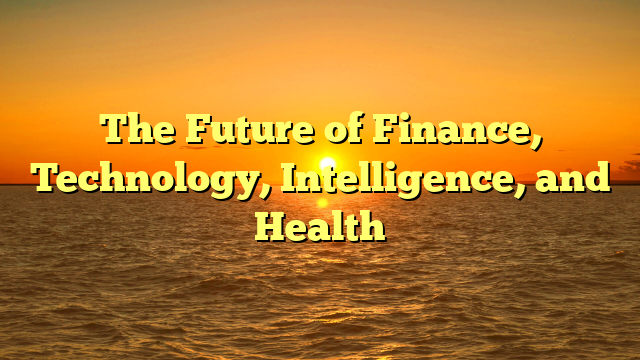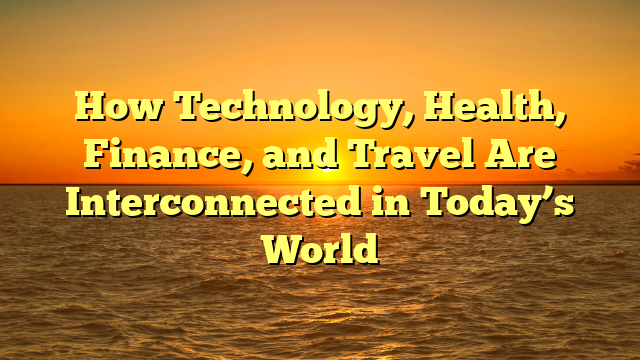With the constant advancement of modern society, it is clear that health, technology, finance, and travel are closely intertwined. These four domains have evolved significantly over time, with technological advancements playing a crucial role in shaping each one. As we navigate this complex and interconnected landscape, it’s essential to understand how these fields influence each other and impact our daily lives. In this article, we’ll explore how technology has transformed health, finance, and travel, and how these industries are evolving in the modern era.
Health: The Impact of Technology
In the past, the healthcare sector was often criticized for being slow to adopt technological innovations. However, in recent years, there has been a massive shift towards integrating advanced technology into healthcare practices. Today, healthcare professionals have access to a wealth of tools that allow them to diagnose and treat patients more efficiently than ever before.
One of the most prominent changes in healthcare is the rise of telemedicine. Virtual healthcare services allow patients to consult with medical professionals remotely, eliminating the need to travel to a clinic or hospital for a check-up. This is especially beneficial for individuals living in remote areas or those with limited mobility. Moreover, telemedicine can be a great tool for managing chronic diseases.
Wearable technology is also revolutionizing healthcare. Devices like fitness trackers can monitor vital signs such as heart rate, blood pressure, and even oxygen levels. This data can be shared with healthcare providers, allowing for proactive intervention if any issues arise. The rise of artificial intelligence (AI) is also playing a role in improving patient care. AI-powered algorithms can analyze medical data and suggest treatment options, sometimes more accurately than human professionals.
Moreover, robot-assisted surgery is transforming the way surgeries are performed. Robots can carry out precise movements that human hands might not be able to replicate, improving patient outcomes and reducing recovery times.
Technology’s Role in Finance
The finance industry has also undergone a significant transformation due to technology. Gone are the days when managing finances meant visiting a bank or using paper checks. With the advent of online banking and mobile apps, managing money has become easier, faster, and more efficient.
Fintech (financial technology) is revolutionizing the way people manage their money. Mobile wallets like PayPal, Venmo, and Apple Pay allow users to send and receive money instantly with just a few taps on their smartphones. This has made financial transactions more seamless and accessible, especially for individuals who may not have easy access to traditional banking services.
Cryptocurrencies such as Bitcoin and Ethereum are also a huge part of the technological revolution in finance. These decentralized currencies allow people to make transactions across borders without needing a central authority like a bank. Gerhanatoto underlying blockchain technology has enhanced security in financial transactions, reducing the chances of fraud.
Another significant advancement in finance is the use of AI and machine learning in financial forecasting. AI algorithms can analyze vast amounts of financial data and predict trends, helping investors make more informed decisions. Robo-advisors, for instance, use these technologies to provide personalized investment advice to individuals without requiring the assistance of a human financial advisor.
How Technology is Revolutionizing Travel
Technology has had a profound impact on the travel industry. Gone are the days when planning a trip meant consulting with a travel agent and flipping through brochures. Today, travelers have the world at their fingertips with the help of mobile apps and online booking platforms. From flight reservations to hotel accommodations and excursions, technology has streamlined every aspect of the travel process.
Online platforms like Airbnb and Booking.com have revolutionized the way people find places to stay. These services provide travelers with a wide variety of accommodation options, from luxury hotels to affordable hostels or private apartments. This has made travel more affordable and accessible, regardless of their budget.
Navigation apps such as Google Maps and Waze have completely transformed the way we navigate the world. No longer do we need paper maps or to rely on directions from locals – a few taps on our smartphones and we can reach any destination, whether we’re in a familiar city or a foreign country.
Virtual reality (VR) and augmented reality (AR) are also gaining traction in the travel sector. VR enables users to explore a destination virtually before booking a trip, giving them a chance to “experience” a place before deciding to visit. It also enables tourists to enjoy virtual tours of famous landmarks, and some travel companies are even using AR to provide interactive experiences during their trips.
Finance, Technology, and Travel: The Symbiotic Relationship
While each of these sectors—health, technology, finance, and travel—benefits individually from technological advancements, their interdependence is clear. For instance, many healthcare providers now offer health insurance plans that integrate with fintech apps, allowing users to manage their premiums and claims with ease. The rise of digital payments and mobile banking also facilitates travel, as tourists can use their phones to exchange currencies, book flights, and purchase goods internationally.
Moreover, AI-driven analytics can help both finance and healthcare industries understand travel trends and customer preferences. This helps businesses in both sectors offer tailored services to travelers who may need specific financial products (like travel insurance) or healthcare options (such as international health plans).
The Future of Health, Technology, Finance, and Travel
Looking ahead, the continued integration of these industries promises even more advancements. The healthcare industry is likely to see further innovations in personalized medicine. Advances in genomics and AI may allow for treatments tailored specifically to an individual’s genetic makeup. Meanwhile, the use of blockchain in healthcare could help improve the security and privacy of medical data.
In the finance sector, more people adopting digital currencies and blockchain-based transactions. With the rise of central bank digital currencies (CBDCs), traditional financial systems are also expected to evolve, offering faster, more secure, and more efficient transactions. Fintech will continue to democratize financial services, offering even more opportunities for individuals to take control of their financial future.
As for travel, the continued advancement of AI, VR, and AR will likely make travel more immersive and personalized. Imagine a future where tourists can enjoy fully interactive experiences at historical sites or museums, using AR to get additional context and information. The growing role of AI-driven services in travel booking will also make it easier for travelers to find the best flights, accommodations, and activities tailored to their personal preferences.
Conclusion
The intersection of health, technology, finance, and travel represents a dynamic and evolving landscape. The rapid advancements in these sectors—especially through technological innovations—are transforming how we manage our well-being, our finances, and our travel experiences. As technology continues to evolve, it is exciting to think about how these industries will continue to shape our world and improve our lives. Whether through telemedicine, digital currencies, or smarter travel tools, the future promises endless possibilities for a more connected, efficient, and exciting world.
The Interconnection of Health, Technology, Finance, and Travel in Today’s World


